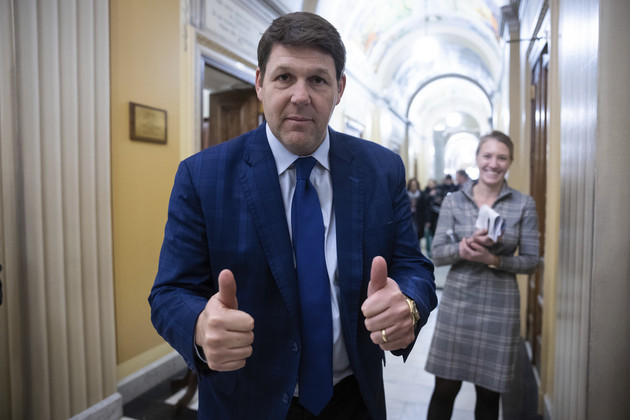Deficit neutral is what you want to achieve,” says House Budget Chair Jodey Arrington
As discussions ramp up on Capitol Hill regarding the renewal of President-elect Donald Trump’s key tax cuts, Republicans are gearing up for a major clash over a potential price tag nearing $5 trillion.
Leading lawmakers in the House and Senate are sharply divided on how to address the budget impact of renewing the various tax cuts that benefit millions of Americans, which are set to expire at the end of next year.
Some Republicans, including House Budget Committee Chair Jodey Arrington (R-Texas), are insisting that any effort to renew tax cuts should not increase the deficit, especially in light of the growing federal deficit. Pointing to the spotlight on Elon Musk’s spending cuts, they argue that there are ample opportunities to trim the budget to offset the costs, such as cutting Medicaid, rescinding green energy tax incentives, and increasing taxes on corporations' overseas profits.
Conversely, lawmakers like Sen. Mike Crapo of Idaho, the GOP’s tax lead in the Senate, have long opposed significantly covering the costs of any tax agreement.
Former President Trump, who will have considerable influence in this debate, appears unconcerned about budgetary costs. He proposed trillions in additional tax cuts during his campaign, on top of those enacted during his first term, and suggested using revenue from tariffs on imported goods to fund them.
This debate, which could impact not only tax policy but also other issues, is expected to unfold in the coming months. Republicans will need to bridge their differences to activate the complex “reconciliation” process, allowing them to bypass a Senate filibuster and push through changes to taxes, as well as potentially immigration and energy policies.
“That’s going to be the biggest challenge for the conference,” said Rep. Greg Steube (R-Fla.), a member of the Ways and Means Committee, referring to the imminent budget conflict.
House Ways and Means Committee Republicans are meeting biweekly with staff to prepare a draft tax plan for January. Meanwhile, top aides to House and Senate leadership are also collaborating to be ready for when Trump takes office on January 20.
GOP lawmakers will need to determine how much, if any, of their tax plan can be allowed to add to the deficit, as this decision will significantly influence which of the various tax cuts under consideration can be implemented.
When the current tax cuts were enacted in 2017, lawmakers spent months determining a total spending limit of $1.5 trillion.
Today, the situation has worsened significantly. Renewing about 40 provisions set to expire is now estimated to cost around $4 trillion, plus an additional $600 billion in interest costs. Meanwhile, the federal debt has nearly doubled since 2017, and rising interest rates have made servicing that debt much more burdensome, costing nearly $1 trillion annually.
House Republicans, including Arrington, emphasize that the tax bill they are crafting should not exacerbate these budget issues.
“There’s no reason for us to do that when we have all these opportunities to address the deficit,” Arrington stated, highlighting his committee's critical role in the reconciliation process.
Rep. Chip Roy (R-Texas), policy chair of the House Freedom Caucus, added, “We need to advance the agenda that the president ran on—he has a mandate—but we must ensure there are corresponding cuts or tax changes to keep it deficit neutral. Under no circumstances should we just say, ‘Here’s the policy,’ without considering the impact on the deficit.”
Potential funding sources include raising tariffs, cutting food stamp spending, and employing dynamic scoring, which estimates tax revenue generated from increased economic activity due to proposed legislation.
Arrington also suggests less conventional options, arguing that Republicans should account for revenue generated from economic growth linked to deregulation, which is currently excluded from the congressional budgeting process.
This view puts him at odds with other Republicans like Crapo, who firmly oppose the idea of offsetting tax cuts with savings. They argue that it’s neither realistic nor necessary to find trillions in savings to cover the costs of their tax plans.
Crapo argues that any existing provisions in the law that are extended should not require offsets, nor should what he refers to as “pro-growth” initiatives. This leaves new tax proposals that aren’t classified as pro-growth needing to be offset—an ambiguous category that could potentially encompass some of Trump’s ideas, although Crapo did not specify which proposals might qualify.
“I’m not going to start evaluating his proposals,” said Crapo. “I can only provide the principles.”
In the House, Ways and Means Chair Jason Smith (R-Mo.) also expressed skepticism about the need for lawmakers to fund all their tax cuts. “Look at history—were the Bush tax cuts paid for?” he noted.
The issue of cost is further complicated by Republicans’ distrust of Congress’ nonpartisan budget analysts and their often-optimistic expectations for dynamic scoring. Many believe the forecasters fail to fully account for the potential economic benefits of tax cuts, despite the current Congressional Budget Office (CBO) director, Phill Swagel, being appointed by Republicans and having served in the George W. Bush administration.
During the last tax overhaul, the CBO estimated that the Tax Cuts and Jobs Act (TCJA) would generate enough additional revenue to cover 20 percent of its cost. However, Swagel has cautioned that achieving similar results will be challenging, as it was largely driven by a 14-percentage-point cut in the corporate tax rate—a measure not currently on the table.
Some lawmakers are pursuing their own dynamic analyses. Sen. Bill Cassidy (R-La.), a fellow tax writer, believes the TCJA generated enough economic activity to nearly pay for itself, despite official forecasts suggesting otherwise. He argues that simply extending that law would also be mostly self-funding.


No comments:
Post a Comment